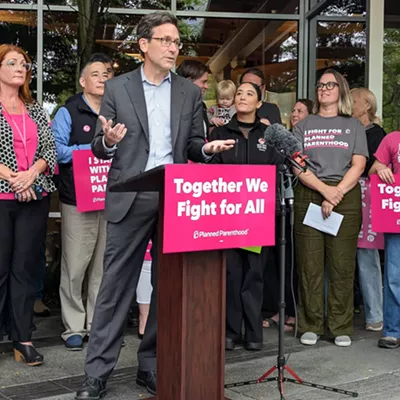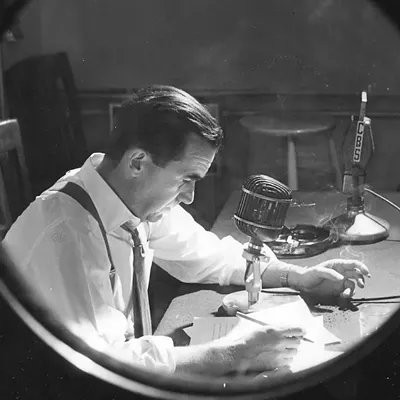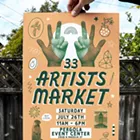The New Year came last Friday night at sundown, welcoming in the start of year 5764. An intimate group of family and friends gathered to celebrate this occasion. It was both joyful as it looked ahead, and sorrowful as it remembered what was in the past.
Welcome to Rosh Hashanah and Beth Haverim, a fledgling Jewish Reform congregation in Spokane. Granted membership in the past year by the Union of American Hebrew Congregations (UAHC), Beth Haverim will culminate its celebration of the High Holy Days on Sunday with Yom Kippur services, which will be led by a Reform Rabbi in Spokane for the first time in 37 years.
"It's always thrilling when a group of Jews want to get together and form a community, because too many people take it for granted," says Rabbi Lawrence Jackofsky, who lives in Dallas and is the Southwest Regional Director for UAHC. "There's a holy day every week, the Sabbath. Yom Kippur is one of the holiest days. What a privilege for me to be in Spokane -- with a community that hasn't always been there -- on what I think is the Sabbath of all Sabbaths."
For Beth Haverim, this year's "Sabbath of all Sabbaths" takes on added significance, because of the Jewish history in the Inland Northwest. (As with Christianity, there are many branches of Judaism: The Reform branch represents more liberal Judaism, while Conservative congregations appeal more to moderate Jews.) In 1966, when I-90 was being built, there were two Jewish congregations in Spokane. The location of I-90 was going to take out the Conservative congregation's temple. So the two decided to merge. The vote on whether they would be Conservative or Reform was close. Legend has it the president of the two congregations broke the tie and Temple Beth Shalom became a conservative congregation.
"What's happening now," says Rabbi David Fine, "is that the religious diversity of the Jewish community in Spokane is now being expressed outwardly rather than inwardly."
Fine, who is based in Seattle, is the director of the Pacific Northwest Council for UAHC. Just after I-90 was built, he recalls, he got a number of calls asking him to set up a Reform congregation in Spokane. His answer was always no. "I wasn't about to disrupt a Jewish community that's not very big," says Fine. "Rabbi Jack Izakson of Temple Beth Shalom has an Orthodox ordination, which is the more conservative branch of Judaism." Fine always told people he was willing to help those who had interest in creating a Reform community on their own. "Frankly, I was concerned that [Izakson] was going to react strongly... negatively to the news of the Reform congregation," says Fine. "Instead, he said, 'How can I help? This is a good thing for our community.'"
What Isakson saw intuitively, Fine believes, is that all Jews would benefit from the addition of a new Reform Congregation in Spokane. "To use a metaphor, one car dealership will do OK, but if you set up three or four everybody wins," says Fine. "This is the marketplace of ideas, of religious thought. There's this sense now that if I don't agree with the thinking of one place, there's another place for me to go, without having to go the full Martin Luther route."
For Jews, Yom Kippur is the culminating day of their annual pilgrimage into atonement. In the final month of the old year, known as El ul, they remember the things they've done wrong to fellow human beings. This is part of the preparation for what happens during Rosh Hashanah. "God can't forgive you for things you've done to other people," says Louisa Rose, who is a member of the Beth Haverim congregation. "First you have to ask people for their forgiveness. Our New Year's celebration reflects this, as we consider both what we've done and how we will live differently in the coming year."
After 10 days of this kind of reflection, the Jews are ready to enter fully into the new life of the New Year, which happens on Yom Kippur. "You're alone with God in the presence of your fellow Jews," says Jackofsky. "Supposedly you've cleaned up your act with humans during El ul. Now you get to deal with God."
At the start of Rosh Hashanah, the shofar, a ram's horn, is blown. The sound is a reminder of the past -- traditionally the horn was blown at critical moments in Jewish religious life -- and the future. "It's a way for us to focus our thoughts in a time of reflection," says Rose. "Not only is it a time to remember, but a time to think about what you want your life to look like."
The congregation at Beth Haverim has had a decade to determine what they want their congregational life to look like. In 1993, friends and family gathered to celebrate Hannukkah. Shortly thereafter, they organized a chavurah, which established them as independent of Temple Beth Shalom. Their goal was to be a place of welcome and support for families creating Jewish households in Spokane. Soon they would like to embark on the process of building their own temple. But what they've become is far more than they ever imagined.
"Within six months of each other, two Reform Jewish congregations were formed," says Fine. "Ner Tamid, which means eternal light, was founded in the midst of ideological and philosophical differences among the chavurah. Their religious orientation, though, allowed them to respectively disagree with each other. This will only enrich Jewish communal and congregational life in the Spokane community."
If you're interested in knowing more about Beth Haverim, call 232-4367 or send an e-mail to bhaverim@aol.com.
Publication date: 10/02/03














